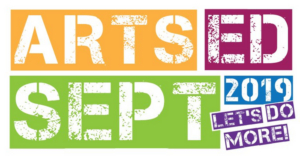New Jersey Becomes First State to Provide Universal Access to Arts Education

Widely recognized as a national leader in arts education, New Jersey has become the first state in the nation to provide universal access to arts education for all public school students according to the 2019 New Jersey Arts Education Annual Summary Report released today by Arts Ed NJ, a non-profit education organization. The review is based on data from the New Jersey State Department of Education for the 2017/2018 school year.
Universal access means all New Jersey public schools provide some form of arts education and every student that attends a public school in New Jersey has the opportunity to participate in arts education programs as part of the regular school day.
"I am grateful that my own education included exposure to the arts, and I know that I would not be where I am today without the skills theatre taught me," said New Jersey Governor Phil Murphy. "I am proud to announce that all New Jersey public schools are now offering arts education. The future of New Jersey is bright, and today's announcement is a critical part of ensuring that our children reach their full potential."
The report also highlights significant gains in arts education participation. More than 81% of all students in New Jersey now participate in art programs every year; that's a 25% increase in student participation over the past decade. This means an additional 250,000 students annually participate in arts education compared to a decade ago. The announcement took place at Paramus High School which was recognized in 2013 as a Model School in the Arts for the state of New Jersey during National Arts in Education Week.
"This is indeed an historic milestone for arts education, not only in New Jersey but for our nation. It is one thing to say we want arts education for every student. It is another thing to take actions to make sure that every child has access to the many benefits an education in the arts provides. said Robert Morrison, director of Arts Ed NJ. "Goal number 1 of the ARTS ED NOW campaign was to reach universal access. We are now able to turn our attention to the quality of experience and assuring inclusive offerings for all NJ students."
Despite the gains in participation over the past decade, there are still more than 26,000 elementary students and another 45,000 middle school students who, based on state policies, should be participating in the arts that are not. There are another 31,000 or so high school students who could also be participating that are not.
In addition, the diversity and equity of course offerings vary widely across the state impacting the quality of arts experiences for students.
The public agrees on the importance of an arts education. According to a 2017 Rutgers- Eagleton Poll, 9 out of 10 residents say that receiving an education in the arts - which includes lessons in dance, music, theater, visual arts, media arts, and other forms of creativity - is "very" or "somewhat" important in the classroom (90 percent), through before or after school programs (93 percent), and through cultural organizations in their community (89 percent).
The effort to reach this arts education milestone began more than a decade ago on September 18, 2007, when the collaborative partnership of the New Jersey State Council on the Arts the New Jersey State Department of Education, the Geraldine R. Dodge Foundation, Playwrights Theatre of New Jersey, and Music for All released the definitive report on the state of arts education in New Jersey schools, Within Our Power: The Progress, Plight, and Promise of Arts Education for Every Child.
The project represented two years of work gathering information from over 98 percent of New Jersey's schools and marked the first time that the Department of Education collected information about the implementation of the New Jersey Core Curriculum Content Standards for visual and performing arts. The report looked at how arts education has changed in the prior 20 years in New Jersey and concluded that while the state had come very far, there was still much work to do to bring arts education to every student.
The study was a monumental opportunity for New Jersey to take a leadership role in data collection efforts and paved the road for future reports including Keeping the Promise (2012) and Arts Ed Now: Every Child, Every School (2017). Since 2013 the New Jersey State Department of Education has included arts education measures in the annual School Performance Reports, becoming the first state in the nation to publicly report such measures.
The 2019 New Jersey Arts Education Annual Summary Report may be downloaded at: https://www.artsednj.org/2019-nj-arts-ed-annual-summary-report
For more information on the state of Arts Education in New Jersey, please visit: https://artsednow.org/.
Comments
Videos

